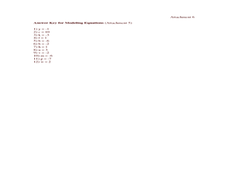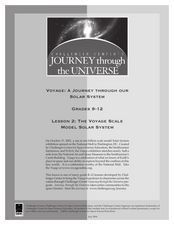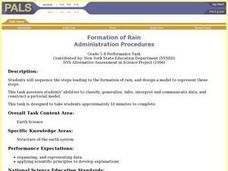Curated OER
Exponential Expressions - Perfect Squares, Square Roots
Color tiles are used to model perfect squares. Alone or in pairs, middle schoolers will find patterns. Afterward, the relationship between perfect squares and roots will be discussed as a whole class.
Curated OER
Weighted Averages
Weighted averages can be tricky to explain! However, this study guide makes it easy for teachers by including definitions, explanations, and breaking down problems into three steps. Includes mixture problems and uniform motion problems.
Curated OER
Five by Two
Help young mathematicians read and interpret numbers from 1 to 10 and sequence them correctly with this card game. Using a deck of cards and two to three classmates, have one player hand out ten cards to each gamer and then put the extra...
Institute of Electrical and Electronics Engineers
Waterproof that Roof!
Stop the raindrops from getting into the house! Eager engineers learn about roofing history and waterproofing by nanotechnology. They get into groups and work on designing a waterproof roof for a small model house. The accompanying...
PBS
Exploring Earthquakes: Earth Foldable
Geology junkies will make a foldable that covers a lot of ground regarding Earth's internal structure, its position in the solar system, and an explanation for its seasons. Templates and a printable page of instructions are included....
Curated OER
Building A Model of the East Pacific Rise
Students describe the physical attributes of the East Pacific Rise. After locating the region on a map, students work in groups do define each layer of the structure in order to begin their build. Students build their model according to...
Curated OER
Comparing Fractions 4
In this elementary math worksheet, students examine the shaded fraction models and compare them to the value given. Then they answer the 3 questions in the multiple choice format.
Curated OER
Atoms, Elements, Molecules, and Compounds
In this elements worksheet, students review the Bohr model and define negative and positive subatomic particles. Students compare molecules and compounds. This worksheet has 11 short answer questions and 4 problems to solve.
Curated OER
Global Warming
In this global warming worksheet, students complete multiple choice questions about global warming. Students complete 5 questions total.
Curated OER
Addition of Fractions
In this fractions worksheet, students answer multiple choice and short answer questions about fractions and how you add them. Students answer 10 questions total.
Curated OER
Problem Solving with Multiplication and Division II: Post Test
In this multiplication and division worksheet, students answer multiple choice questions where they problem solve multiplication and division problems in word problems. Students answer 10 questions total.
Curated OER
Big Bellies and Dandy Duffs
Learners practice tracing and identifying lower-case b and d letters as well as pictures containing examples of those letters. They mimic the sounds that the letters make and offer examples of those sounds rhyming when applicable.
Curated OER
Algebra/Geometry Institute Summer 2009
Students investigate linear equations through models. In this algebra lesson, students investigate solving one and two step equations. Review solving a basic equation before starting this assignment.
Curated OER
Economics Unit I - The Basics
Twelfth graders access how scarcity requires individuals and institutions to make choices about how to use available resources. They explore the characteristics of different economic systems and institutions. Student are able to describe...
Curated OER
The Voyage Scale
Students identify how models are powerful tools of exploration and that the sizes of the planets and distances between the planets in the Solar System span a large range. They make a sign for each planet they have created in the lesson...
Curated OER
Formation of Rain
Students sequence the steps leading to the formation of rain, and design a model to represent these steps. This task assesses students' abilities to classify, generalize, infer, interpret and communicate data, and construct a pictorial...
Curated OER
Introduce /B/
Young scholars demonstrate how to pronounce the letter "b" sound. In this sound fluency lesson, students practice saying the "b" sound orally and repeat words that contain the letter "b." Additionally, young scholars demonstrate the...
Curated OER
Merry Christmas, Mr. Bean!
In this Christmas worksheet, students watch a video, put sentences in order, complete multiple choice questions, put words in different forms, and more. Students complete 5 activities.
Curated OER
Three D Constellations
Students address a major misconception in astronomy, the understanding of scale. The lesson is designed to introduce students to both celestial coordinates and to the first rung on the distance determination ladder, parallax.
Pennsylvania Department of Education
Making Cubes
Third graders explore vocabulary associated with three dimensional figures. In this transformations lesson, 3rd graders create two dimensional nets for three dimensional figures. Students become familiar with describing two...
Curated OER
D.E.W. (Drop Everything and Write!)
Young scholars gather, determine validity and reliability of, analyze and organize information. They employ the most effective format for purpose and audience. Students write fully developed paragraphs that have details and information...
Curated OER
Making Your Dog Your Best Friend
Students delve into dog training. In this biology lesson plan, students learn that hands, voice and heart is the basis of dog training and through demonstration and take part in a hands-on experience to teach a dog simple commands and to...
Curated OER
Goldilocks and the Coordinate Grids
Where this lesson idea is lacking in materials, it makes up for with creativity! Using "Goldilocks and the Three Bears" as the background, mathematicians plot points on a coordinate grid to create props for the story. The polygons all...
Curated OER
Measuring Temperature and the Production of CO2 in Yeast
Students use a model experiment to complete an experiment on yeast. In groups, they identify the independent and dependent variables and use the scientific method to complete the activity. They record their observations and discuss them...























